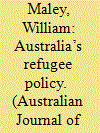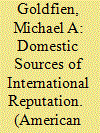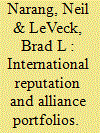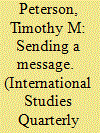| Srl | Item |
| 1 |
ID:
147642


|
|
|
|
|
| Summary/Abstract |
Refugee policy involves a two-level game. For Australia since approximately 1998, the politics of refugees has been toxically affected by domestic politics. This has had potentially negative effects on Australia’s reputation and soft power. This article provides an overview of the issue, explores the ways in which considerations of domestic politics have come increasingly to shape Australia’s policy and concludes with a discussion of the consequences of Australia’s treatment of refugees for its diplomacy and soft power.
|
|
|
|
|
|
|
|
|
|
|
|
|
|
|
|
| 2 |
ID:
193656


|
|
|
|
|
| Summary/Abstract |
Existing research finds that leaders develop international reputations based on their past behavior on the international stage. We argue that leaders’ domestic choices can also influence their international reputations, perhaps as much as their past foreign policy decisions do. Using formal theory and intuitive argumentation, we develop an overarching framework to predict how much any domestic choice will affect a leader’s international reputation. We theorize that certain domestic choices can inform expectations about future international crisis behavior based on the extent to which (1) the costs at stake are similar to those of an international crisis and (2) the domestic issue is salient relative to foreign policy. We use conjoint experiments and other evidence to show that many domestic choices have significant international reputational effects. There is some evidence that the reputational effect of certain domestic choices may equal that of fighting in a previous international crisis.
|
|
|
|
|
|
|
|
|
|
|
|
|
|
|
|
| 3 |
ID:
166000


|
|
|
|
|
| Summary/Abstract |
Why do states ever form military alliances with unreliable partners? States sign offensive and defensive military alliances to increase their fighting capabilities in the event of war and as a signal to deter potential aggressors from initiating a crisis. Yet, signing an alliance with an unreliable partner is at odds with both of these rationales. This should be particularly concerning for peace scholars and policymakers, since the uncertainty generated by unreliable partners may increase system-wide conflict. This article provides an answer to this puzzle by arguing that states continue to form alliances with unreliable partners because they can adopt rational portfolio-diversification strategies. Drawing on well-developed models from portfolio theory, we present evidence that states design their overall alliance portfolios to minimize the risks posed by allies with a reputation for being unreliable. Specifically, we show that unreliable allies are more likely to be pooled into multilateral alliances that dilute risk rather than bilateral alliances, and that states allied with unreliable partners form a greater number of alliances to hedge against the added risk of default. Together, our results demonstrate why unreliable partners may not lead to increased conflict initiation, while also providing a novel explanation for previously unexplained variation in the structure of alliance portfolios. The article contributes to the literatures on international reputation and the rational design of international institutions by demonstrating how international reputation matters in subtle and often overlooked ways.
|
|
|
|
|
|
|
|
|
|
|
|
|
|
|
|
| 4 |
ID:
126491


|
|
|
|
|
| Publication |
2013.
|
| Summary/Abstract |
Studies often assume that empty sanction threats inflict reputation costs on senders. However, target response to senders' previous decisions whether to back down or impose sanctions remains unexamined. In this paper, I argue that the target of sanction threats looks to the sender's actions against prior resistant targets. When the sender has backed down recently, the target, inferring that the sender is prone to making empty threats, is less likely to acquiesce. Conversely, when the sender has recently imposed sanctions against a resistant target, the current target infers that sanction imposition is likely to follow resistance, and therefore, it is more likely to acquiesce, all else equal. In statistical tests of US sanction threats spanning 1971-2000, I find strong evidence that the target is less likely to acquiesce when the United States recently backed down from a sanction threat. I find somewhat weaker evidence that the target is more likely to acquiesce when the United States recently imposed sanctions.
|
|
|
|
|
|
|
|
|
|
|
|
|
|
|
|